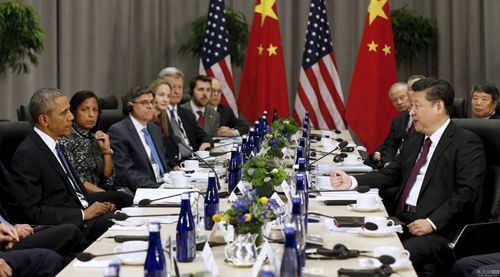By Zhao Minghao, a research fellow at the Charhar Institute and an adjunct fellow at the Chongyang Institute for Financial Studies at Renmin University of China. He is also a member of the China National Committee of the Council for Security Cooperation in the Asia Pacific (CSCAP).

During his attendance at the 4th Nuclear Security Summit, Chinese President Xi Jinping met with US President Barack Obama. This was the first meeting for the two leaders this year. They hoped that through this strategic communication they can create conditions to constructively manage differences and enhance cooperation between the two countries.
The Xi-Obama meeting sent a clear signal to the world that nuclear safety has become a new bright spot in China-US cooperation. Since both China and the US are nuclear powers, strengthening nuclear security is in accordance with common interests of both sides. Although Obama vowed to build a "world without nuclear weapons", the reality is that the international nuclear security situation is becoming increasingly serious. Besides the issue of stalling US-Russia nuclear disarmament talks, other types of nuclear risks worldwide are also on the rise. In addition, once terrorist organizations acquire nuclear materials, it could be possible for them to build crude nuclear weapons, resulting in "nuclear terrorism".
Undoubtedly, China and the US are making efforts in promoting their common interests and cooperation. For example, the two nations have published the third Joint Declaration on Climate Change, and announced that both will sign the Paris Agreement on April 22. As the largest developing and developed nations, their decision to sign the agreement will inject great momentum to global efforts in coping with the challenge of climate change.
For his part, Obama promised that the US supports China's efforts in economic transformation, including its supply-side reform. He hopes to work with China to strengthen the coordination of macroeconomic policies.
In September this year, the G20 Summit will be held in Hangzhou city, east China. As the world's two largest economies, China-US collaboration will provide necessary conditions for revitalizing the staggering world economy. China and the US are making efforts to reach a mutually beneficial, win-win, bilateral investment agreement. This would be very helpful in enhancing the economic cooperation between the two countries.
The China-US cooperation at the global level is hard-earned. The world cannot afford the price of confrontation between the two countries. In recent years, China and the US had obvious differences and conflicts regarding the South China Sea, internet security, among other issues. Both sides need to control sensitive issues in a constructive way to avoid misunderstandings and miscalculation in a bid to prevent disruptions in the overall China-US cooperation.
This is also one of the main objectives of President Xi's meeting with US President Obama. In consideration of the realities of the current international challenges, China-US cooperation can achieve important goals; however, the confrontation between the two countries could ruin everything. Building "a new type of major country relations" put forward by China aims to make sure that there are no conflicts and confrontation between the two nations. Building "a new type of major country relations" calls for the strategic vision and patience by the leaders of both nations and also needs the continuous efforts of both sides. The 2016 spring meeting of Xi and Obama brings new prospect to the world that the development of China-US relationship is maintaining a growing momentum.

Zhao Minghao, a research fellow at the Charhar Institute and an adjunct fellow at the Chongyang Institute for Financial Studies at Renmin University of China. He is also a member of the China National Committee of the Council for Security Cooperation in the Asia Pacific (CSCAP).
( The opinions expressed here do not necessarily reflect the opinions of Panview or CCTV.com. )

Panview offers an alternative angle on China and the rest of the world through the analyses and opinions of experts. We also welcome outside submissions, so feel free to send in your own editorials to "globalopinion@vip.cntv.cn" for consideration.















